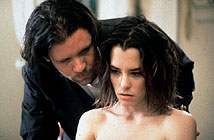|
|
|
|
Henry
Fool
|
 |
|
Henry Fool joins 1998's sad list of disappointing films by good directors. It is as flat and tired as The Big Lebowski, Fear and Loathing in Las Vegas or Midnight in the Garden of Good and Evil. Abandoning the exciting experiments explored in his previous two Godard-inspired films (Amateur [1994] and Flirt [1995]), Hal Hartley winds back to a grinding, clumsy, primitive mode that is less accomplished than what he did nine years ago in his debut, The Unbelievable Truth (1989). Hartley has devised an odd project for himself here. First, he strips his style of all embellishment, making the film visually resemble a bland telemovie. Next, he adopts a storytelling mode that pretentiously mimics ancient, allegorical, moral tales like The Pilgrim's Progress – setting up characters with names such as Henry Fool (Thomas Jay Ryan) and Simon Grim (James Urbaniak). Lastly, and most direly, Hartley extends to what, in his career, amounts to an epic running time: 137 very taxing minutes. The plot concerns the encounter between the itinerant Fool – a dangerous, licentious, brooding, anti-social intellectual – and Grim, a quiet, bespectacled type who works as a garbo to support his family. Where Fool seems to be all talk and no action, Grim is revealed as a dark horse, a wild revolutionary poet whose work, once finally published, brings scandal and celebrity. Fool, instrumental in Grim's success, is peeved: isn't his unpublished, endless Confession just as important and powerful? Where the new elements of the film fail to intrigue, the familiar elements simply drone. When in trouble, Hartley brings out his bag of old tricks. There are ragged gags about dysfunctional families: Grim's mother Mary (Maria Porter) mopes around and chain-smokes, while his sister, Fay (Parker Posey), snaps insults and hurls herself out the front door in search of casual sex. There is the self-conscious, monotonal mode of vocal delivery imposed on all the actors. There is the unlikely and unconvincing surge of pathos in the final minutes. All these devices are dull from overuse. Worse still, Hartley seems unable to break out of his sophomoric sense of smart humour. The dialogue takes the creaky form of a Beat-style musing on uninteresting existential problems, artlessly punctuated by droll references to bodily functions and daily mundanities. It all comes to resemble a version of The Benny Hill Show for first-year art school students – which does not make for a pretty picture. MORE Hartley: Simple Men, Trust © Adrian Martin November 1998 |
![]()